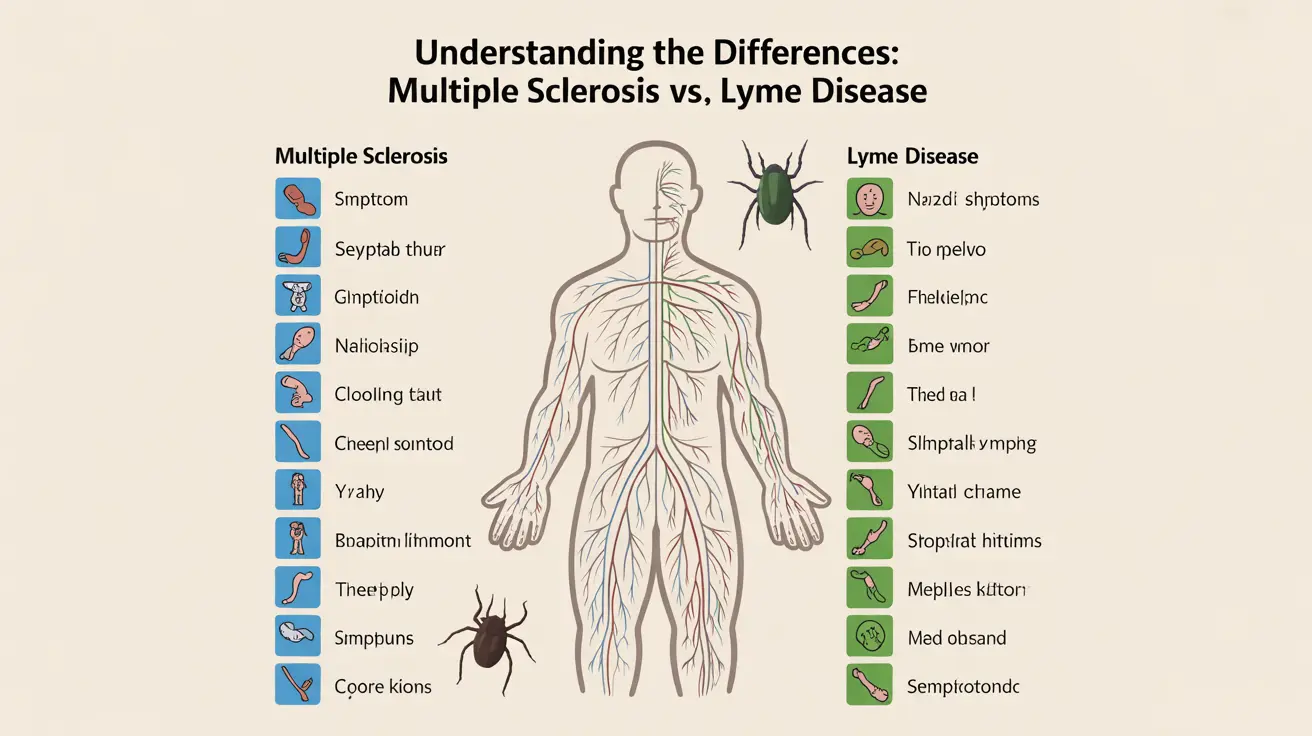Multiple sclerosis (MS) and Lyme disease can present with remarkably similar symptoms, making accurate diagnosis challenging for healthcare providers. Both conditions can affect the nervous system and share several neurological symptoms, but understanding their distinct characteristics is crucial for proper treatment and management.
This comprehensive guide explores the key differences between MS and Lyme disease, focusing on symptoms, diagnostic approaches, and treatment options to help patients and healthcare providers make informed decisions.
Distinctive Symptoms and Characteristics
While MS and Lyme disease can share common symptoms, several key differences can help distinguish between the two conditions:
Multiple Sclerosis Symptoms
- Vision problems (optic neuritis)
- Muscle weakness and spasticity
- Balance issues and coordination problems
- Fatigue
- Cognitive difficulties
- Heat sensitivity
Lyme Disease Symptoms
- Bull's-eye rash (erythema migrans)
- Flu-like symptoms in early stages
- Joint pain and swelling
- Bell's palsy
- Heart rhythm abnormalities
- Migrating muscle and joint pain
Diagnostic Approaches
Accurate diagnosis requires different testing methods for each condition:
MS Diagnostic Tools
- MRI scans showing specific lesion patterns
- Spinal fluid analysis
- Evoked potential tests
- Blood tests to rule out other conditions
Lyme Disease Testing
- Two-tier blood testing approach
- ELISA test
- Western blot test
- Clinical examination and history of tick exposure
Neurological Imaging and Testing Challenges
Both conditions can show abnormalities on brain and spine imaging, but certain patterns help differentiate between them:
MS Imaging Characteristics
- Multiple lesions in specific areas of white matter
- Periventricular lesions
- "Black holes" on T1-weighted images
- Active inflammation with contrast enhancement
Lyme Disease Imaging Features
- Less specific lesion patterns
- Possible enhancement of cranial nerves
- Generally fewer lesions than MS
- May show improvement with treatment
Treatment Approaches
Treatment strategies differ significantly between the two conditions:
MS Treatment Options
- Disease-modifying therapies
- Symptom management medications
- Physical therapy
- Occupational therapy
- Lifestyle modifications
Lyme Disease Treatment
- Antibiotic therapy (typically 2-4 weeks)
- Extended treatment for persistent symptoms
- Supportive care
- Anti-inflammatory medications
- Rest and recovery support
Frequently Asked Questions
What are the key symptoms that help distinguish Lyme disease from multiple sclerosis (MS)?
The presence of a bull's-eye rash and history of tick exposure are distinctive for Lyme disease, while MS typically presents with more prominent visual disturbances and heat sensitivity. Lyme disease often has migratory joint pain, while MS symptoms tend to be more neurologically focused.
How is Lyme disease diagnosed differently from multiple sclerosis, especially when neurological symptoms overlap?
Lyme disease diagnosis relies heavily on blood tests (ELISA and Western blot) and history of tick exposure, while MS diagnosis typically involves MRI scans, spinal fluid analysis, and evoked potential tests to establish evidence of damage in multiple areas of the central nervous system.
Can Lyme disease be mistaken for MS on MRI scans and other neurological tests?
Yes, both conditions can show white matter lesions on MRI scans. However, MS typically shows more specific lesion patterns, particularly in periventricular areas, while Lyme disease lesions are often less numerous and less specifically distributed.
What treatment options are available for Lyme disease compared to multiple sclerosis?
Lyme disease is primarily treated with antibiotics for a defined period, while MS requires long-term disease-modifying therapies and ongoing symptom management. The treatment approach for each condition is fundamentally different due to their distinct underlying causes.
Why is it important to get an accurate diagnosis when experiencing symptoms common to both MS and Lyme disease?
Accurate diagnosis is crucial because the treatment approaches are entirely different. Treating MS won't help Lyme disease, and antibiotics won't help MS. Misdiagnosis can lead to delayed appropriate treatment and potentially worse outcomes for either condition.




